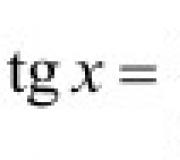Roskomnadzor is again threatening to shut down Telegram and has ordered operators to test a new “bazooka.” Google, Gmail and Youtube are partially blocked in Russia Why was Google banned?
The Russian-language version of the Google website was temporarily included in the registry of prohibited sites compiled by Google. This led to some providers blocking access to the popular search engine, which social network users complained about.
Google.ru was blacklisted based on a decision of the Federal Tax Service () more than a year ago.
“We know that some users are having problems accessing the google.ru website. There are no technical problems on Google's side. We are looking into the situation,” a Google spokesperson said.
Google Ads Let Down
The blocking problem has now been resolved - about that » Interfax" said the head of Roskomnadzor Alexander. “The problem was, it was not a false blocking. Google had a redirect from the bookmaker's website, so operators began to block it. Google has already removed the redirect, the problem was quickly resolved,” said the head of the supervisory agency.
It turned out that the website google.ru was included in the register on the basis of Art. 15.1 (on information, information technologies and information protection) by decision of the Federal Tax Service dated June 14, 2016.
The Cybersecurity and Co. Telegram channel, run by IT specialist Alexander Litreev, reported that Google in Russia “managed” to block , Telecom TZ, Science and Communications, Maxima Telecom, TTK, Stalnet, Signal, MaryinoNet and about a dozen other providers. Litreev himself conducted investigation and found out why Google got into the register because of gambling sites.
As the expert stated, the issue is not the found vulnerability of the system, but the incompetence of the employees who entered the site with prohibited information - instead of a direct link, the business address of the search engine’s advertising network was added to the list.
“Voila, RKN killed Google for a huge number of Russians,” writes Litreev.
“This is simply incompetence - people do not understand anything about how advertising networks of search engines like Yandex.Direct and Google AdWords work,” the analyst added.
Gazeta.Ru contacted the director (IRI) for project activities to find out whether Roskomnadzor, in principle, has grounds to block Google. The expert confirmed that the reason for adding a search engine to the registry could only be an error or misunderstanding.
“Despite various scandalous initiatives in the field of Internet regulation, Russia is confidently moving along the path free movement and exchange of information, access to legal sources of its distribution, which is the Google search service. Any restrictions introduced in our country are minimal and are caused by ensuring national security: countering the spread of illegal content, terrorism and extremism. Blocking Google in the current situation would be barbaric,” said Gazeta.Ru’s interlocutor.
Google banned
Despite a fairly prompt solution to the problem, the news of Google being blocked instantly spread throughout social networks, causing a huge number of publications. Many noted that the phrase “Are you banned from Google” took on new colors.
In addition, users joked that Roskomnadzor could not remove Google from the register of prohibited sites, because now it could not “Google” how to do it.
Some also noted that Google's ban should make employees very happy.
In general, the blocking of Google.ru came as a complete surprise to everyone, since Roskomnadzor did not make any statements about the existence of violations. The situation is completely different with the Telegram messenger, which Zharov’s department has long been trying to add to the register of organizers of information dissemination, and therefore to obtain the necessary identifiers from it.
Telegram and its creator do not make contact with Roskomnadzor and do not respond to its requests, which led to the head of the department promising to personally demand the necessary data. Zharov added that he was “waiting and waiting for a response from the messenger,” but has not yet achieved any result.
Well, finally, at least some digestible information.
Question : Why is Google+ blocking a profile... or My Google+ account was blocked - why and what to do?
So, from official sources (response from a Google employee):
For those who are faced with the problem of blocking a Google+ profile, I inform you that when blocking user profiles, we are guided by the following Rules regarding user behavior and content posted by them.
Some tips to avoid being blocked:
1. Please indicate your real first and last name or the first and last name by which your friends, relatives and colleagues know you.
If you use your real name on your profile, you will be easy to find online. Titles that are used to address you in professional, educational, social, or religious settings (such as "Doctor," "Reverend," or "Professor") cannot be included in profile fields. Examples of violations: Dr. Stanislav Liventsov; D. M. Sergeev.
The name should also not contain unusual or unnecessary characters, such as * or @.
2. Do not post sexually explicit material.
In order to unblock access, follow the instructions indicated on your profile page and your profile will soon be unblocked. If account unlocking is refused, then the violations remain. Correct them, file an appeal and the account will be opened.
Sincerely,
Kate.
Source - Google Forums
I will quote another answer to a similar question:
Profile blocking is due to a violation Rules use of the product. Please read the Rules and correct violations before filing an appeal or complaint on this forum. You can correct violations by following the instructions on your Profile page.
Most common cause blocking is the addition of a fictitious or non-existent name.
Here real examples names of Profiles that we have recently blocked:
Children's toys
- Father Frost
- I'll tell you the truth
- Baby Class
and there are hundreds, if not thousands of them!
Attention: Names must be real without unnecessary abbreviations and symbols! Here are the criteria we use when blocking accounts for the wrong name.
If you do not want to provide your real name, you can opt out of Google+ features.
In my opinion, it’s a rather strange reason for the blocking... Maybe you’ll also need to provide your passport details and identification code?)))
After such explanations, Twitter becomes all the sweeter to me) - and my wonderful friends - Dunno, Violet, Toffee and others). Warm feelings...
The main thing is that now it’s clear where you can address people in Russian. So, the forum page support, where there is a chance that professionals, and perhaps even Google employees, will answer you - Google+ forum.
The regulator reminds that the company refuses to filter prohibited content
Moscow. 12 December. website - If Google ignores the requirements to filter search results from prohibited content, changes will be made to the law to allow the search engine to be blocked, Deputy Head of Roskomnadzor Vadim Subbotin told Interfax.
“The current law does not currently imply blocking, it implies an administrative fine. But you understand that if we reach a dead end, then at the legislative level we have every opportunity to resolve this issue. If the state sees that some foreign company is not complies with Russian legislation consistently and systematically, then the state makes changes to the law, and for failure to comply with Russian laws, a more severe punishment is possible, such as blocking,” Subbotin said.
He noted that amendments could be made to 149 the federal law"About information". “Our entire Internet industry is regulated by this law,” Subbotin clarified.
“We are talking about child pornography, suicide, drugs, gambling, the sale of alcohol. We are talking about extremism and terrorism. This is the information that is prohibited in our country. And this is what we want Google to filter,” explained the deputy head of the department.
At the same time, he emphasized that he hopes that such radical measures will not come to pass, and that the company will come to constructive cooperation.
On the eve of Roskomnadzor Google 500 thousand rubles for refusing to filter prohibited content. The head of the department, Alexander Zharov, said that sites from the unified register of prohibited information are present in the search engine results. He stated that Roskomnadzor will continue to remind Google of the need to comply with Russian legislation, and in the event of a new refusal, it will continue to do so against the company.
A law requiring search engines to connect to the federal government information system(FSIS), containing a list of prohibited sites (Unified Register of Prohibited Information), came into force on September 26. As Interfax was informed by the press service of Roskomadzor, at the same time the regulator sent demands for connection to the FSIS to the companies Google, LLC, Yandex LLC, Sputnik LLC and Mail.Ru LLC.
"As of the end of October, all operators of the above search engines, except Google service, have connected to FSIS and comply with legal requirements regarding the termination of issuance at user requests search engine information from the unloading,” noted Roskomnadzor.
Previously, I wrote what to do if the Chrome browser blocks some diary page, in the post “” (November 16, 2012).
I highly recommend reading it first because I don't want to repeat the same thing. And there it is written in detail why Google blocks the page, what to do, how to find a “dangerous” file and how to fix everything. Today is about why Google Chrome blocks good sites, another one wrote.
Last year’s post suggested two solutions to the problem: 1) open the page using a special link and wait for Google to remove the site from the “black list” and 2) find and delete or change the file that is blocking the page.
The method of searching for the required file through the source code of the page scared some with its “complexity”, so today I’ll tell you how easier (and better!) it is to find what Chrome doesn’t like.
Advantages of the second method:
— we find all the files in the diary, and not just those posted on the blocked page
- no need to search in the source code page
At the same time, you can fix the problem in the same Chrome browser without installing other browsers.
When Google blocks a page, its message indicates which site caused it:
“This web page was inserted with content from [site name], a known malware distributor.”
We copy the domain of the dangerous site, click the “Advanced” (or “Advanced” in new versions of Chrome) link in the message and “By continuing, you act at your own peril and risk.”
The diary page will be unlocked. Now you need to go down to the bottom of the page (press the “End” key on your keyboard). Paste the copied address into the LiRu search form and click the “Find” button.

A page opens with search results, which will contain links to all diary entries that contain links to the “dangerous” site or pictures and other files that were copied from it.

Now that we have found and opened the posts, we have several options to solve the problem:
— delete entry
— close the entry from unauthorized persons (which can be done temporarily and with the entire diary, by the way)
— delete a file hosted on a “dangerous” site
- upload this file to LiRu
All this is described in detail in the post to which I provided a link at the beginning.
Under the title of the “dangerous” post, click “Edit”.

If one of the advanced editors is enabled, then click the “Source” button.

We find the address from the Google Chrome warning message and... See the post “How to find and remove dangerous content from your diary.”
In general, the main idea of this post is that through the LiRu search you can much more conveniently find ALL entries that contain links to a “dangerous” site, due to which the diary is blocked.
If you find an error, please highlight a piece of text and click Ctrl+Enter.




